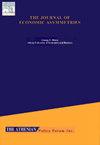Monetary policy rules and the ECB rotation model
Q1 Economics, Econometrics and Finance
引用次数: 0
Abstract
In this article, we apply three different specifications of a monetary policy rule to reveal the interest rate preferences of the national central bank governors of the euro area. These preferences are combined with information from the ECB rotation model to determine whether a central bank governor was allowed to vote at a certain meeting. Finally, we empirically test whether non-voting governors or specific countries are worse off when not allowed to vote compared to a situation where they have a voting right. Our results indicate that there are only very few occasions where this is indeed the case. Thus, we conclude that the current form of the rotation model in the euro area does not discriminate any national governor or country.
货币政策规则和欧洲央行轮换模式
在本文中,我们运用货币政策规则的三种不同规格来揭示欧元区各国央行行长的利率偏好。这些偏好与欧洲央行轮换模型中的信息相结合,以确定央行行长是否被允许在某次会议上投票。最后,我们通过实证检验了与拥有投票权的情况相比,没有投票权的央行行长或特定国家的情况是否更糟。我们的结果表明,只有极少数情况确实如此。因此,我们得出结论,欧元区当前形式的轮换模式不会对任何国家的理事或国家造成歧视。
本文章由计算机程序翻译,如有差异,请以英文原文为准。
求助全文
约1分钟内获得全文
求助全文
来源期刊

Journal of Economic Asymmetries
Economics, Econometrics and Finance-Economics, Econometrics and Finance (all)
CiteScore
4.80
自引率
0.00%
发文量
42
审稿时长
50 days
 求助内容:
求助内容: 应助结果提醒方式:
应助结果提醒方式:


